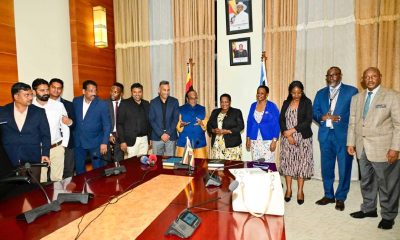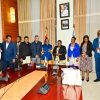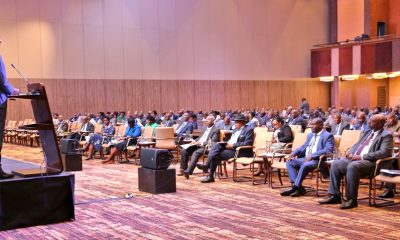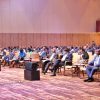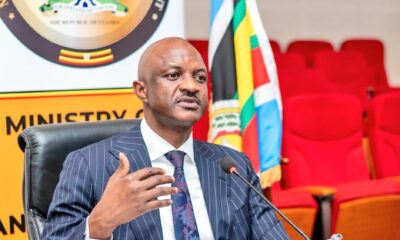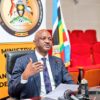Ramathan Ggoobi
The military and poverty alleviation in Uganda
Mr. President stop politicking; pick the money you are squandering on cash handouts, buy inputs, give them to OWC commanders to salvage your legacy
Early this week, I was invited to give a lecture to Zonal Commanders of the Operation Wealth Creation (OWC), the latest initiative to alleviate poverty among Ugandans. For starters, recently the President started a program codenamed OWC to banish subsistence farming and poverty from Uganda, by starting with the zones which supported him during a series of his liberation struggles, right from the one against Idi Amin.
The program has been crafted in such a way that former operational zones, training camps and secret cells used during President Museveni’s past military expeditions have been reactivated, this time not to shoot at enemy targets but to shoot poverty and subsistence agriculture out of Uganda. Military commanders, from the rank of Major upwards, have been appointed and posted in each of these zones to coordinate and oversee the implementation of the program. These are the commanders I interacted with this week.
I approached my lecture, intended to enlighten the commanders about the economics of poverty reduction, by first delineating the past anti-poverty programs that this government has rolled out with nothing much to show at the end of the day.
I told them that in the more than quarter a century of President Museveni’s leadership, several promising and compassionate plans, programmes, and projects have been implemented to fight poverty. In 1988, just two years into power, the NRM Government rolled out a World Bank project named PAPSCA (Program for Alleviation of Poverty and Social Costs of Adjustment), then PAP (Poverty Alleviation Project) of 1993, the Entandikwa scheme in 1996, PEAP (Poverty Eradication Action Plan) of 1997, the PAF (Poverty Action Fund) of 1998, the PMA (Plan for Modernisation of Agriculture) and the Vision 2025.
When all these failed to make any headway, government launched Bonna Bagaggawale (Prosperity for All) in February 2007, and quickly penned and rolled out a five-year plan, the National Development Plan (NDP), in 2010. Before even we got a situational report on the progress of the NDP, we were invited to witness the launch of Vision 2040.
This particular vision reminded me of the new rule of forecasting which advises planners to “forecast so far into the future that no one will be there to tell whether you got it right or wrong.” How many Ugandans, who are conscious of the Vision 2040 today, will be there in 2052 to call the planners at NPA to account?
I outlined to them the key factors that failed the past efforts to fight poverty in Uganda. Researchers have found that chronic accountability deficiency is main cause of failure of these programs. I often tell people that Uganda has all resources needed to transform its economy but lacks one key resource — human character (that concept of right or wrong conduct). Implementers of anti-poverty programs often suffer a paucity of reputation — built on ethical capital. To put it bluntly, those entrusted with the task of helping the poor steal the resources and use them to enrich their own families. The few beneficiaries that are lucky to receive these would-be revolving funds have also often refused to pay back.
Add to that the chaotic political-administrative interface in this country, the low priority assigned to agriculture, and the low priority assigned to rural infrastructure especially feeder roads, health facilities, education facilities, and rural energy, the platform of failure is well built.
Yet I rate the OWC so highly. Why? I find the Operation Wealth Creation a unique and pioneer homegrown anti-poverty strategy for the following reasons. Firstly, its military touch. The military is known for its virtues of pragmatism, accountability, and respect. People tend to take the military more seriously. Those who don’t respect soldiers at least fear them! The zonal commanders who are implementing the program may not be the most upright individuals but the fact that they are coming from an environment where orders must be taken without question, and at the end of the task one must account, failure of which calls for prosecution under military law, some sanity in the fight against poverty might prevail.
Secondly, the nature of OWC’s pioneer beneficiaries — the veterans of FRONASA, NRA/UPDF, FEDEMU and UFM — also gives the program a chance to succeed. Unlike civilians, former combatants, by virtue of their training and nurturing, are more disciplined. They can easily be whipped into line. My damn feeling is that they are more likely to use the resources given to them productively and on purpose, unlike the civilians that received money under the past programs and diverted them to consumption — alcohol, paying bride price to marry more wives, buying fancy mobile phones and other modern gargets. Once the program succeeds among the veterans I think it would be easier to extrapolate it among the rest of the poor.
Thirdly, the OWC is multi-sectoral in approach — encompassing income (wealthy creation and food security), health, education, infrastructure, investment, industrialization, export (marketing), environmental preservation, rural electrification, research, mobilization, credit and saving. This makes it different from past efforts that focused solely on income, yet as we all know poverty is not necessarily lack of money but rather a multi-dimensional problem.
However, I told the zonal commanders, most of who are at the rank of Lieutenant Colonels, that for the above advantages to play in their favour, they must do what other implementers of anti-poverty programs in the past have failed to do — accountability and transparency. In told them that without being transparent with OWC resources and accountable, people would lose trust in them.
I also told them that Ugandans no longer trust leaders and technocrats, and that people also believe that nothing can be done in the public interest because leaders are thieves. So I told them this is the last chance they have to prove to Ugandans that there are still some few Ugandans who can do something for the good of the people. And I told them that this is the last opportunity they have.
So, Mr. President, this is the last opportunity your government has to prove to Ugandans that it can still do anything in their interest, let alone fighting household poverty. I seriously believe this particular program can succeed because of the people behind it — soldiers. I am one of the few Ugandans who are honest enough with their conscious, and have come to realize that poor societies are built not by civilian jokers in neckties and white shirts, but by well-grounded men dressed in camouflage uniforms. In my research in development economics, I searched around for a single country that developed without the military playing a central role and failed to chance on a single one.
The challenge with us, however, is over politicization of everything. From education, health, and the economy, this government uses political lenses to look at nearly everything. This is what is failing most of these noble programs. Take the example of the fight against poverty and unemployment; you, Mr. President, have distorted these initiatives in search for political support. That money you put in envelopes and sacks to donate to the poor, the youth, the clergy, the elderly, the orphans and all sorts of people, would impact more to these very people if you pooled it into a well structured program such as the OWC.
Studies have found that cash handouts targeted at providing poor households with “direct support”, often seen as charity handouts, do not have economic impacts. Researchers who have studied consumers’ use of cash donations have often found that “households spent 20 – 40 percent of their donations on consumer goods (food, mobile phone and airtime, alcohol, clothes etc) during the three-month period in which their donations were received and roughly another third of their handouts during the subsequent three-month period.”
If a similar formula were to hold in your cash donations, Mr. President, the Shs. 250 million you gave to Busoga youth in April last year, for example, would lead to some Shs. 158 million in retail spending over a six-month period, or about Shs. 26 million per month. This implies that if you go back to Kaliro (Busoga) today, chances are that you will find the very youth you handed the sack broke. This is exactly what happened during the Entandikwa scheme of mid-1990s, where $6 million (Shs. 15bn) were squandered annually by your government on cash handouts.
Now that you have the OWC, please stop politicking; pick the money you are squandering on cash handouts and buy inputs; give them to your zonal commanders; put in place a strong monitoring team, sit back and watch as your lieutenants help salvage your legacy. If there is any chance of wiping poverty out of the homes of the poorest of the poor in Uganda, that chance lies in the Operation Wealth Creation not in patronage spending.
Comments





